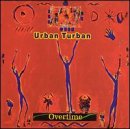Album DescriptionMany Capitols and Metropolis's of our day and age are meltingpots of different cultures. The variety of languages, traditions, cultures and handicrafts always invite to a voyage of discovery. URBAN TURBAN reflects this manifold through a music mirrow. The origin of URBAN TURBAN has quite a bit of resemblence to the experimental impulse of their bandleader Peter Bryngelsson. During a recording session, he decided to try an old folk instrument, the "Hurdy Gurdy" (BarrelOrgan), to see if it was possible to play the Blues with it. The outcome was fantastic. Peter then decided to invite fellow musicians to listen to his discovery. Together they let their minds run free, to create something new, without loosing their roots in Blues. The multicultural background of the musicians formed all of their ideas to this unique sound. URBAN TURBAN plays an interesting style of EthnoBlues, abolishing "normal" structures through their instrumentation, their inspiration, the rhythm or the arrangements. Despite of all these "new" sounds, their music reflects their good mood and joy in making music. With their first album, they reached the top position of the World Music Charts Europe. As quickly as this happened, the word also spread, that they are one of the most interesting liveacts. On the new album "Overtime" are own compositions as well as John Mayall adaptions ("Laurel Canyon Home", "Miss James") and classical Blues ("40 Nights and 40 Days"). The closest comparison are associations to Jah Wobbles or Tranceglobal Under ground. You could also picture it as "Captain Beefheart meets an arabian Big Band in the desert during a jam session". Their current album was already released in Sweden and it received incredible reviews. Göteborg Tidningen describes "Overtime" as "one of the best albums of the year", Arbeterblader named it a "giant cultural crash" and Smelansposten called it "just simply excellent". Besides the 8 musicians, Peter Bryngelsson invited guest musicians for the recording of "Overtime". One of them is the popular turkish musician, 'Zyia Aytekin', who now lives in Sweden. Aytekin became famous for his soundtrack on the film "Yo". In their songs, the musicians reflect signs of the times, they ironically take up position against racism, as shown in the song "Fear". "Instead of being afraid of the different cultures, we should try to understand each other and build bridges between our cultures", says Peter Bryngelsson. URBAN TURBAN tries this with their own method as musicians.


 Track Listings (10) - Disc #1
Track Listings (10) - Disc #1